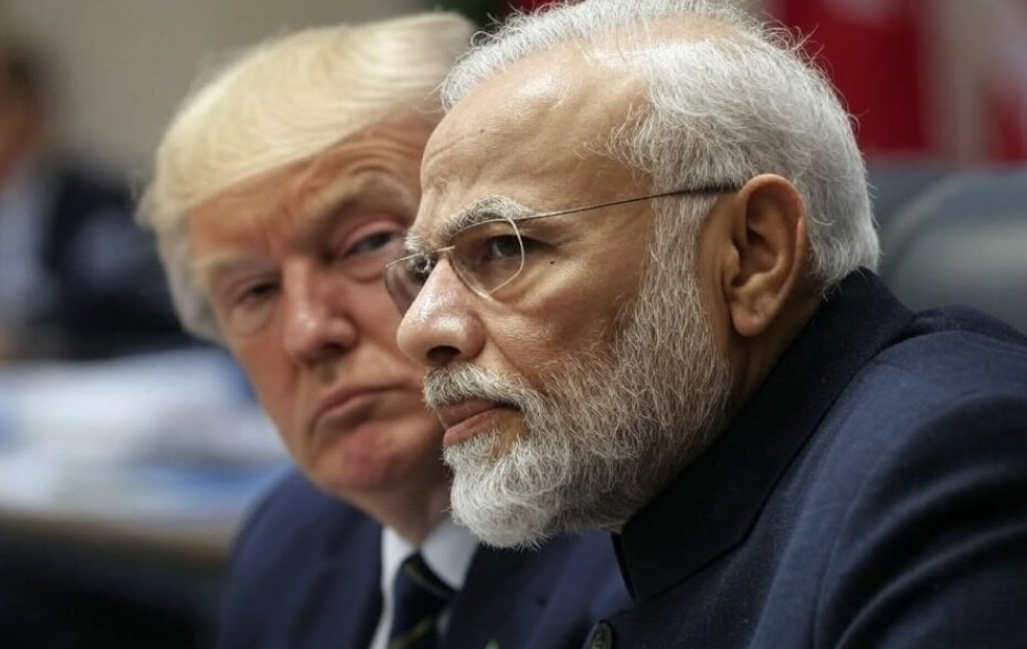
The controversy surrounding India’s decision to import cheap Russian oil has taken a new turn, as U.S. President Donald Trump imposed steep tariffs on Indian oil purchases from Russia, while allowing China to continue importing without facing any penalties. This stark difference in treatment has sparked accusations of double standards, raising questions about Trump’s policy motives and Washington’s real strategy behind this unequal approach.
The issue first came to light when Trump announced an additional 25 percent tariff on India’s Russian oil imports, effectively raising the overall tariff burden to 50 percent. Trump justified this move by claiming that India’s increasing reliance on Russian crude was helping Moscow sustain its wartime economy amid the ongoing Russia-Ukraine conflict. According to Trump, all countries buying Russian oil would face “extra tariffs,” but the reality on the ground suggests otherwise.
While India was singled out for punitive measures, China — the world’s second-largest buyer of Russian oil — faced no such penalties. Beijing continued to import Russian crude without any new tariffs or restrictions, even as Trump’s administration doubled down on punishing New Delhi. This contrasting approach quickly drew international criticism, with many analysts accusing Washington of adopting a China-favoring strategy while unfairly targeting India.
India’s Ministry of External Affairs strongly condemned the U.S. decision, stating that the country’s energy imports are based on market factors and the fundamental need to ensure energy security for its 1.4 billion citizens. New Delhi maintained that it had every right to purchase oil from the cheapest available source in order to stabilize domestic fuel prices and reduce inflationary pressures. Officials also highlighted that Russian oil has been a critical component in maintaining India’s energy supply during a period of global volatility.
The controversy deepened when U.S. Treasury Secretary Scott Besant issued a statement defending Trump’s decision. In a televised interview, Besant argued that China’s oil imports from Russia had increased only marginally, from 13 percent before 2022 to about 16 percent today. He contrasted this with India’s dramatic surge in Russian oil imports, which rose from less than 1 percent to nearly 42 percent of its total crude purchases. According to Besant, India’s sharp pivot toward Moscow was not simply about energy security but also about profiteering.
Besant went further, claiming that India made an additional six billion dollars in profits by importing discounted Russian crude and reselling refined products to global markets. He argued that this practice effectively undermined the U.S.-led sanctions regime by allowing Russia to maintain a steady flow of revenue, thereby sustaining its war economy. In his view, punishing India was justified, since the scale and nature of its imports differed significantly from China’s more stable purchasing patterns.
Earlier, U.S. Secretary of State Marco had also offered an explanation for why China was spared from the same tariff treatment. He pointed out that directly targeting Chinese refiners with secondary sanctions could destabilize global oil markets. According to Marco, if Washington restricted Chinese refineries from processing Russian oil, the result would be a severe shock to global supply chains. China, being one of the largest importers and refiners of crude, would simply reprocess the oil and push it back into international markets, driving up prices for consumers worldwide. For this reason, the U.S. considered it too risky to impose punitive tariffs on Beijing, despite its continued reliance on Russian crude.
Nevertheless, this justification has not silenced criticism. Many observers view Washington’s approach as deeply hypocritical, noting that India, a democratic partner of the U.S. and a key player in the Indo-Pacific strategy, is being punished, while China, a geopolitical rival, is spared. Critics argue that this selective enforcement reflects not strategic necessity but rather political maneuvering that undermines trust between Washington and New Delhi.
For India, the stakes are high. Its reliance on discounted Russian oil has grown significantly in recent years, providing not only cheaper fuel for domestic consumption but also an opportunity to strengthen its refining sector by exporting processed petroleum products at a profit. From India’s perspective, this strategy is both logical and essential, especially given the global energy crisis triggered by Western sanctions and supply chain disruptions. However, with Trump’s additional tariffs now raising costs, India may be forced to reconsider its energy trade patterns or risk long-term strain in U.S.-India relations.
At the same time, questions remain about whether India will openly challenge Washington’s decision. While the Ministry of External Affairs has voiced disapproval, New Delhi has so far avoided direct confrontation with the Trump administration. Analysts believe that India may continue to quietly lobby against the tariffs while simultaneously seeking alternative energy arrangements to minimize dependency on Russian imports.
The broader issue, however, goes beyond just oil imports. Trump’s uneven tariff policy highlights the complexity of global geopolitics, where economic decisions are often intertwined with strategic calculations. By sparing China, the U.S. may have hoped to avoid a global oil shock, but in doing so it has also signaled to the world that its rules are not applied equally. For India, this episode reinforces a hard truth: in global power politics, economic pragmatism often overrides fairness.
As the debate intensifies, one central question emerges: was buying cheap Russian oil a mistake for India, given the backlash it now faces? While the discounted imports have provided short-term benefits in terms of lower fuel costs and higher refining profits, the long-term diplomatic costs could be significant. If the U.S. continues to treat India and China differently, tensions may grow not only over trade but also in broader strategic cooperation.
In the coming months, the world will be watching closely to see whether India escalates its opposition to Trump’s tariffs or seeks a compromise. Either way, the controversy has already exposed the inherent contradictions in America’s sanctions policy, raising doubts about its consistency and fairness on the global stage.




